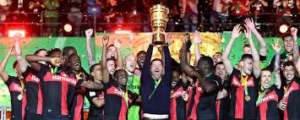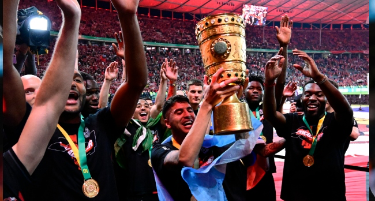It was a tense and thrilling encounter at Berlin’s Olympia stadion, Bayer Leverkusen secured the German Cup with a hard-fought 1-0 victory over Kaiserslautern, thanks to Granit Xhaka’s stunning goal.
This triumph not only added a second trophy to Leverkusen’s cabinet this season, completing a league-cup double, but also underscored their resilience and determination, especially after suffering a setback in the Europa League final just days earlier.
Leverkusen, who clinched the Bundesliga title in mid-April, faced a stern test against their second-division opponents. The match’s pivotal moment came early in the first half when Odilon Kossounou received his marching orders after picking up a second yellow card just before the break.
This left Leverkusen to play nearly half the game with ten men. Despite this disadvantage, Xhaka’s 16th-minute strike from long range proved decisive. The Swiss international, known for his ability to score spectacular goals, unleashed a left-footed shot from well outside the penalty area, leaving Kaiserslautern’s goalkeeper with no chance.
Kaiserslautern, a storied club with four German championships to their name but languishing in the lower leagues since 2012, were aiming to become only the second team from outside the top division to lift the Cup, following Hannover’s success in 1992.
Their journey to the final saw them face just one Bundesliga side, the relegated Cologne, and they were determined to make history. The Red Devils, backed by a fervent fanbase, nearly capitalized on their numerical advantage when Tobias Raschl’s effort narrowly missed the target following Kossounou’s dismissal.

Leverkusen manager Xabi Alonso, visibly distressed by Kossounou’s red card, made tactical adjustments at halftime to shore up his defense. He substituted striker Patrik Schick and winger Jonas Hofmann, bringing on more defensive players to withstand the anticipated Kaiserslautern onslaught. The move paid off, as Leverkusen adopted a more conservative approach, focusing on counter-attacks and maintaining their defensive solidity.
The second half saw Kaiserslautern pressing for an equalizer, spurred on by their passionate supporters who had unveiled a giant Red Devil mascot before kickoff. Despite their best efforts, they struggled to break down a resolute Leverkusen defense.
Alonso’s tactical nous was on full display as he managed the game expertly, even halting a counter-attack by physically stopping his player Florian Wirtz to slow the game’s tempo and preserve their lead.
Leverkusen’s success this season has been built on a foundation of attacking football, but in this final, they demonstrated their ability to adapt and defend under pressure. This victory added to their historical tally, making it the second German Cup in the club’s history, the first since 1993, and their third major trophy following their 1988 UEFA Cup win.
This Cup final was notable not only for Leverkusen’s victory but also for breaking the dominance of Bayern Munich, Borussia Dortmund, and RB Leipzig, none of whom featured in the final for the first time since 2012. The match showcased the unpredictability and excitement of football, as well as the tactical acumen of Alonso, who, in his first full season as manager, has already made a significant impact.
Reflecting on the victory, Xhaka and Alonso both highlighted the team’s spirit and determination. “To win like that at the end, we showed our team spirit. We fought hard, we did it for everyone, the fans, the club,” Xhaka told Germany’s ARD.
Alonso added, “To achieve the double, it’s been a great season.” This triumph, coming after the heartbreak of the Europa League final loss to Atalanta, where their season-long unbeaten run ended, provided a perfect conclusion to a remarkable season for Leverkusen.
Kaiserslautern, while disappointed, can take pride in their Cup run and use this experience as a foundation to build on their quest to return to the Bundesliga. Their journey to the final captured the imagination of football fans and reminded everyone of the magic of the German Cup, where underdogs can challenge the giants of the game.




